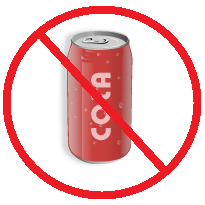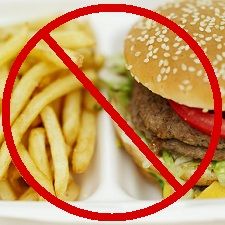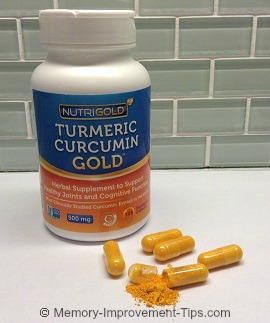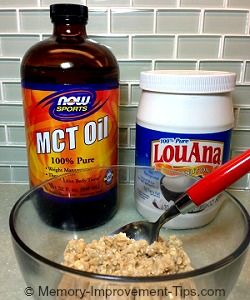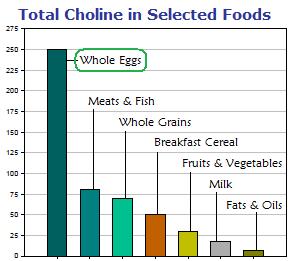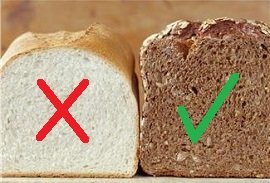- Home
- Better Memory
- Diet and Memory
Diet and Memory Tips to Boost Brain Power
Is there a connection between a healthy diet and memory? Yes, because your brain needs the right nutrients to function properly.
It's also the case that being overweight or obese is associated with memory loss, learning problems, and even dementia.
Below are dietary changes you can make to help improve your memory. For the scientific evidence, see the research studies list at the bottom of this page.
And if you are overweight, consider starting a healthy eating and exercise program. Reaching a healthy body weight not only lowers the risks of heart disease, diabetes, and cancer.
It can also improve brain function and reduce the risk of Alzheimer's disease.
Eat High-Omega Fish & Take Fish Oil
Your brain needs essential fatty acids to work well. Essential fatty acids are called "essential" because your body cannot make them. These fatty acids must be eaten in food. Examples include Omega-3 and Omega-6 fatty acids.
You might think something called "fatty" would be bad for you. Actually these are "good" fats. In fact, large percentage of your brain is composed of these types of fats. So if you don't consume enough fatty acids in your diet, your memory and other brain functions will suffer.
To increase the amount of omegas in your diet, eat more "fatty" fish and take liquid fish oil. The fish highest in omegas include salmon, mackerel, sardines, rainbow trout, and albacore tuna. If you don't like fish or eat it rarely, consider taking a fish oil supplement.
The best type of fish oil to take is high-grade pharmaceutical fish oil in liquid form. I personally take one to two tablespoons of Carlson's fish oil every day.
Some people prefer the fish oil capsules, and they are easier to find, but it's actually a lot more expensive that way.
Drink Green Tea & Peppermint Tea
Many health benefits are attributed to green tea. For example, this traditional Chinese beverage may fight cancer and boost cardiovascular health. But it's also very good for your brain.
Green tea has been shown by research to not only improve memory, but also protect the brain from Alzheimer's memory loss. Read more about the amazing brain benefits of drinking green tea.
Green tea is wonderful, but you might want to have a cup of peppermint tea every once in a while, too. Research indicates peppermint tea can boost alertness and mood. And a more positive mood itself can strengthen working memory and decision making.
Eat Other Brain Foods
There are certain foods that are either suspected to improve brain function or have been proven to do so.
Many of these brain foods protect your brain by releasing anti-oxidants, natural chemicals that break down harmful compounds called "oxidants" that your body produces naturally. Others, such as foods high in magnesium fight age-related memory loss.
Most of these foods also contain important vitamins and nutrients essential for health.
Brain foods include:
- Apples
- Asparagus
- Avocados
- Bananas
- Blueberries
- Dark green vegetables, such as spinach
- Eggs
- Flaxseed oil
Because each food is a little different, it is important to eat a variety. You need a well-rounded diet of brain foods to get the most benefit.
Try to eat at least one serving of each brain food at least once a week. Eating them every day would be even better!
Take a Vitamin Supplement
This is a quick diet and memory fix to cover any vitamin deficiencies you might have. Take one multivitamin a day with food.
I take 1 men's multivitamin, 1 B-complex vitamin, and 1 Vitamin C (1000mg) vitamin every morning with breakfast.
The B-complex is important because the brain uses B-vitamins for many functions. The Vitamin C helps with immunity and provides other health benefits.
There are other supplements I take as well, including fish oil and whatever herbal supplement I'm experiementing with at the time.
Stop Drinking Sodas
Regular soda is a sugar bomb. You brain needs a steady stream of glucose to work properly, not a truckload of refined sugar dumped on it all at once.
At a minimum, switch to diet soda - but I have heard that the artificial sweeteners in diet drinks can give you everything from gas, to cancer, to memory loss.
Instead, drink at least 2 liters (quarts) of water a day. This will also help you avoid dehydrating, which can hurt your memory directly.
That might seem like a lot of water, but you can easily drink that much if you make it part of your daily routine. My trick for drinking enough water is to re-use plastic 16oz water bottles.
I keep a bottle with me at all times. Each time I drink one, I refill it with tap water. I have these bottles all over the place - in my car, at my desk, next to my bed, in the refrigerator. It's a really simple trick.
Cut Back on Fast Food
Everyone knows that many items at fast food restaurants are high in calories, saturated fat, and salt. If you often eat fast food, consider cutting back or switching to healthier items on the menu.
Why is this important for your memory? One reason has to do with the oxygen supply to your brain. A diet high in saturated fats and salt can lead to carotid artery disease.
Carotid artery disease is a narrowing of the carotid arteries of the neck. These arteries supply blood and oxygen to the front part of your brain where thinking, speech, and other higher functions occur.
If your carotid arteries become clogged with fatty deposits (as happens with carotid artery disease), the supply of blood and oxygen to your brain is diminished. This can make it harder to think clearly and remember things. It also increases your chances of having a stroke.
And a diet high in saturated fats is one of the major risk factors for carotid artery disease.
Lose Some Weight
Get your weight down. Being overweight can lead to problems with your blood sugar - including diabetes.
Most of the time your brain's only fuel is the sugar in your blood. Control your weight to keep your blood sugar steady. This will help your brain and memory work better and give you more mental energy.
Keep these wise sayings about weight loss in mind:
Clogged with yesterday's excess, the body drags the mind down with it.
- Horace
The commonest form of malnutrition in the western world is obesity.
- Mervyn Deitel
Drop some pounds to improve your health and your brain!
Chew Gum
 This is a simple diet and memory trick. Some research studies indicate that chewing gum can improve short-term and long-term memory. Researchers found this even with sugar-free gum, so it's not the sugar.
This is a simple diet and memory trick. Some research studies indicate that chewing gum can improve short-term and long-term memory. Researchers found this even with sugar-free gum, so it's not the sugar.
One theory of why this works is that the chewing motion increases your heart rate. Increased heart rate increases blood flow to your head and brain. More blood flow means more oxygen, which helps your brain work better.
Rather than chewing gum constantly throughout the day, maybe save it for times when you need to perform well mentally. It's probably not a good idea to chew gum when giving a speech or other situations where you need to talk. But when studying, reading, or taking an exam, chewing gum might give you that extra mental edge.
If you decide to start chewing gum, I'd suggest the sugar-free variety only. Orbitz is one brand that I like. It comes in several different flavors. But any sugar-free gum is fine.
Spice It Up with Turmeric
Want to protect your memory against Alzheimer's? Spice up your food with turmeric seasoning or take a turmeric supplement.
India has the lowest incidence of Alzheimer's disease in the world. Alzheimer's is four times more common in the U.S. by comparison. Researchers think this may be due to widespread use of turmeric in traditional Indian food. Turmeric is the orange-yellow spice that gives curry its flavor and color.
Consumption of turmeric is not compatible with certain medical conditions. Before you add turmeric to your diet, be sure to check out the list of turmeric side effects.
The active ingredient in turmeric is curcumin. Unfortunately you'd need to eat quite a lot of turmeric to raise your blood concentration of curcumin to high enough levels to protect your brain cells.
As an alternative, you can now buy turmeric supplements. The best of these combine commercial-grade turmeric with Biophene, a compound that increases blood concentration of curcumin by 2,000%.
Eat Chocolate for a Quick Memory Boost
Here's a diet and memory trick you probably weren't expecting. Research from the Wheeling Jesuit University in West Virginia shows that eating milk chocolate or dark chocolate can improve memory by as much as 20%.
However, chocolate is also full of sugar and fat which is bad for you. So what should you do?
Save the chocolate for "crunch" time. Right before an exam or before you give a presentation, eat a small bar of dark chocolate to give your brain a boost. (Dark chocolate is healthier than milk chocolate, because it provides benefits for your heart.)
Note: If you are trying to lose weight or trying to get very lean, skip this suggestion. Personally I almost never eat chocolate although I used to be a choco-holic.
Eat More, Smaller Meals - and DON'T Eat Late at Night
To perform your best mentally, keep your blood sugar steady throughout the day. The best way to do this is to eat five or six small meals during the day rather than three large meals.
Overall, you may eat the same number of calories. But spreading out the calories into smaller meals helps your body regulate your blood sugar more easily.
HOWEVER, avoid eating within 3 hours of bedtime. And if possible, don't get up in the middle of the night for a snack or meal. Researchers have found that late night eating interferes with the creation of new memories.
Eat Breakfast
Skipping breakfast is very common in the United States and some other countries. But students who skip breakfast have worse memories and get lower grades in school on average. Many research studies support this.
Obviously, the negative effects of skipping breakfast also apply to adults and their performance at work. Do you want to advance your career and be a top performer? Start every day with a healthy breakfast!
It's simple - your brain and body need refueling after fasting overnight. A quick example: Eat a banana and a piece of whole-wheat toast with peanut butter.
Avoid sugary stuff that will cause your blood sugar to crash later. Traditional greasy breakfast food is probably not what your should eat regularly either.
Eating breakfast every day is a quick and easy diet and memory trick that no one should neglect.
Cook with Coconut Oil
Brain cells use glucose (blood sugar) for energy. If your brain has trouble processing glucose, as happens in diabetes or Alzheimer's disease, you might develop memory problems. But there is one other fuel your brain cells can use: Ketones!
Consider including coconut oil and MCT oil in your diet as a healthy way to supply your brain with a ketone fuel source. These oils convert to ketones naturally in the body.
You can cook with them or put them your coffee and oatmeal as I do every day. I don't have diabetes or Alzheimer's (yet), but why not help my brain just in case?
According to Dr. Mary Newport, coconut oil and MCT oil are responsible for reversing her husband's memory loss and returning his quality of life. He has early-onset Alzheimer's disease.
Eat Whole Eggs for the Choline
Research has shown that dietary choline can improve attention and long-term memory. Choline is highly concentrated in certain foods. (See graph at right.)
Foods with the highest levels of choline include beef liver and whole eggs. To help improve your memory, include more of these in your diet. Especially the eggs!
For years we were advised to avoid whole eggs, because it was thought the yolk would raise our cholesterol. But the latest research shows that eating the yolk doesn't actually affect the level of bad cholesterol much.
A few whole eggs per week aren't going to hurt. In fact, eggs are full of good fats, protein, vitamins, and yes, memory-boosting choline.
Eat an Afternoon Snack
Blood sugar levels can dip in the afteroon. A couple hours after lunch, have a healthy snack like a protein smoothie and a piece of fruit. This will help you maintain alertness throughout the rest of the day.
Avoid Foods Made with White Flour
Anything that spikes your blood sugar will crash your brain later and leave you unfocused. Avoid foods made with white flour, such as white bread, white pasta, donuts, and so on. Instead eat whole grains.
I completely cut out white flour from my diet and now only eat whole wheat and whole grain foods.
Examples: Whole wheat bread, whole wheat pasta, oatmeal.
Avoid Alcohol
I'm not going to lecture anyone on this. I think everyone knows that drinking too much alcohol kills brain cells.
That's not where you want to go - if anything you want more brain cells! Drink moderately or not at all.
Some people drink wine in moderation (one or two glasses a day) for the health benefit. This is probably fine.
Brush and Floss
 According to a UCLA School of Dentistry research study, tooth and gum disease are highly linked to clogging in your carotid arteries, major arteries in the neck that send blood to the brain.
According to a UCLA School of Dentistry research study, tooth and gum disease are highly linked to clogging in your carotid arteries, major arteries in the neck that send blood to the brain.
Clogged arteries mean restricted blood flow - which means less oxygen and nutrients for your brain, which can potentially hurt your concentration and memory.
So keep your teeth clean and visit the dentist regularly!
Limit Daily Food Calories
If you really put away the food at mealtimes, consider cutting way back. Research published in Nature Neuroscience explains that when your stomach is empty, a hormone called ghrelin is released in the memory centers of the brain.
Ghrelin causes new connections to form between brain cells. The study claims that when laboratory animals were injected with ghrelin directly, their memory and learning improved significantly.
Another study found that people who consumed a high amount of calories had double the risk of developing Mild Cognitive Impairment (MCI) later in life.
So apparently there are some benefits to being hungry!
The lesson: There is no magic memory pill. Instead, the link between diet and memory is to eat and drink the best fuel to keep your brain humming along at it's best.
A proper, healthy diet will help improve your "natural" memory. Then use the memory systems and other memory techniques to build up your "trained" memory.
[+] References for Diet & Memory
Published: 02/10/2007
Last Updated: 06/11/2020

Newest / Popular
Multiplayer
Board Games
Card & Tile
Concentration
Math / Memory
Puzzles A-M
Puzzles N-Z
Time Mgmt
Word Games
- Retro Flash -
Also:
Bubble Pop
• Solitaire
• Tetris
Checkers
• Mahjong Tiles
•Typing
No sign-up or log-in needed. Just go to a game page and start playing! ![]()
Free Printable Puzzles:
Sudoku • Crosswords • Word Search





